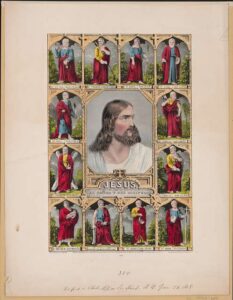Today’s QQ: Does Jesus’s Selection of the Twelve Male Apostles Disqualify Female Leaders?
Have you ever wondered what you’d ask Jesus if he suddenly appeared while you were walking with a friend as he did with Cleopas on the road to Emmaus (Luke 24:13–35)? If that happened to me—after I’d peeled my forehead off the ground and could form words again—I’d ask Jesus about women and the church. I’d query, “What is your ideal for church leadership: Male-female distinctions or complementarity with mutuality in leadership?”
In the Bible, multiple stories show that Jesus esteems women. His teaching elevated women’s status, including affirming their desire to acquire knowledge and wisdom for teaching. Tabitha is called a “disciple” (Acts 9:36). And, many female disciples traveled with Jesus, and were models of faith. Read more about Jesus and women here.
What we don’t find in the Scriptures is Jesus’s explicit or implied statement that church leaders must be men. His stated emphasis for ministry leaders was service, not hierarchical power. Aída Besançon Spencer writes, “Leaders are to be like Jesus, who came to serve and to give his life as a ransom for many, not like the Gentiles who ‘lord it over’ others (Mk 10:42–45).1
Circling back to today’s question: Does Jesus’s selection of twelve Jewish male disciples disqualify women in the mission of God from serving as pastor or elder? Does it set a precedent for male-only ministry leadership?
Examining the Scriptures:
Jesus chose the Twelve Apostles: Now it was during this time that Jesus went out to the mountain to pray, and he spent all night in prayer to God. When morning came, he called his disciples and chose twelve of them, whom he also named apostles: Simon (whom he named Peter), and his brother Andrew; and James, John, Philip, Bartholomew, Matthew, Thomas, James the son of Alphaeus, Simon who was called the Zealot, Judas the son of James, and Judas Iscariot, who became a traitor (Luke 6:13–16; Matt 10:1–4).
Jesus gave assignments to the Twelve: He appointed twelve (whom he named apostles) so that they would be with him and he could send them to preach and to have authority to cast out demons (Mark 3:14–15).
Jesus foretells the future to Peter, In the age when all things are renewed, when the Son of Man sits on his glorious throne, you who have followed me will also sit on twelve thrones, judging the twelve tribes of Israel (Matt 19:28).The apostle John describes the vision he is given, “The holy city—the new Jerusalem—descending out of heaven from God” in which, “The wall of the city has twelve foundations, and on them are the twelve names of the twelve apostles of the Lamb” (Rev 21:2–14).
Commentary: Defining “apostle,” the named apostles, and Junia.
Defining “apostle:”
- An apostle is a messenger, a “sent” one
- One who had been “with” Christ (Luke 8:1–3)
- An eyewitness to the resurrected Christ (Mark 16:9–14; John 20:11–30; Acts 1:21–22)
- Given authority to cast out demons (Mark 3:15)
- Commissioned to preach the gospel (Mark 3:15)
The named apostles in the Bible:
After Jesus’s ascension, the inner circle of the Twelve Apostles expanded to other disciples with the divine call to be “sent”—those who had been “with” Christ and were eyewitnesses of his resurrection.
The named apostles besides the Twelve are Matthias, Paul, Barnabas, James, brother of Jesus, Apollos, Epaphroditus, Andronicus, Junia, Silas, and Timothy.
What about Junia?
Junia is the first female apostle. Paul describes her as his kinsman, a fellow prisoner, and an apostle: “Greet Andronicus and Junia, my fellow Jews who have been in prison with me. They are outstanding among the apostles, and they were in Christ before I was” (Rom 16:7).
Two controversies surround Junia. One is the question of sex. Junia was understood to be a female by all the early church writers, including Origen, Chrysostom, Jerome, and others, as well as many Greek and Latin commentators through the Middle Ages. Chrysostom wrote,
“Greet Andronicus and Junia… who are outstanding among the apostles”: To be an apostle is something great. But to be outstanding among the apostles—just think what a wonderful song of praise that is!… Indeed, how great the wisdom of this woman must have been that she was even deemed worthy of the title of apostle.”2
Mysteriously Junia became a “he” through a translation sex-change. This “sex transition” began with Martin Luther’s translation of the Bible in the 16th century, and continued through the mid-1990s in many Bible translations. Interestingly, during the decades that some believed Junia to be a “he,” Andronicus and Junias [masculine version] were viewed as apostles, outstanding apostles. Substantial scholarly research has proved beyond a doubt that Junia was a common female Latin name during the early church times. There is no evidence of any masculine forms of the name Junia in the Greco-Roman era.
Which brings us to the second controversy. Once it was reestablished that Junia was indeed a female, some Bible translators began to assert that she was not an apostle, but merely “esteemed by” the apostles.3 Why? A prevailing view deemed it unacceptable for a woman to be an apostle.
Scholar’s Views: Complementarians and egalitarians disagree about whether the Twelve establish a precedent for male-only leadership in the church, but they agree there is a symbolic parallel between the twelve disciples and the twelve patriarchs (the sons of Jacob). This parallel illustrates that Jesus’s teaching and salvific work was for all Israel.
Complementarian View:
Many complementarians point to the maleness of Jesus’s first apostles as the precedent for male-only leadership in the church. James Borland writes, “As a testimony of the fact that male leadership in the church has been permanently established by Christ, the names of the twelve apostles are forever inscribed on the very foundations of heaven itself.”5 He continues, “Of course, Jesus treated women with dignity and respect, and we should learn from His example. But such examples are not directly relevant in discussing women in leadership of the church.”6
Piper and Grudem, editors of Recovering Biblical Manhood and Womanhood, write, “We would not argue that merely because Jesus chose twelve men to be His authoritative apostles, Jesus must have favored an eldership of only men in the church. But this argument would be at least as valid as arguing that anything else Jesus did means He would oppose an eldership of all men or the headship of husbands.”7
Egalitarian View:
Aída Besançon Spencer writes, “Jesus’ choice of the Twelve indicates the importance of the new covenant’s being founded on the old covenant… Gentile inclusion in God’s household rests on the earlier witness of Jewish apostles and prophets (Eph 2:20).”
Spencer continues, “The Twelve could not have been other than Jewish free males. If there had been Gentiles or women or slaves among them, the deliberate reconstitution of Israel in Jesus himself, signaled by the Father at his baptism (Matt 3:13–17), simply would not have worked… Consequently, the Twelve cannot serve as precedents for Gentile leadership, which is what prevails in the church today.”FN8
Philip Payne writes, Simply choosing men for the twelve apostles does not logically exclude women from church leadership any more than his choosing free Jews for the twelve apostles excludes Gentiles or slaves from leadership.”9
A Neither Comp Nor Egal View:
Andrew Bartlett, who ascribes to be neither a complementarian nor an egalitarian, raises several concerns about setting a binding rule of male-only leadership in local churches. He writes, “We know that he [Paul] believed in the equal spiritual status of men and women (Gal 3:26–29) and in the Spirit’s distribution of gifts to all believers, and that these gifts included teaching and governing (1 Cor 12; 14; Rom 12:36).” Therefore, “From these beliefs, it would follow that suitably gifted women may teach and govern as leaders.
”Bartlett continues, “But if Paul is concerned to preserve male leadership authority, why in [1 Timothy 4] verse 12 does he apparently ban teaching by women of men without also banning prophecy by women to men? Paul’s numbered list in 1 Corinthians 12:28–29 does not show teachers to be more authoritative than prophets. He mentions prophets before teachers not only in that list but also in Romans 12:6–7 and Ephesians 4:11.”10
3 Key Takeaways:
- Junia is a female name aka Junia was a female. Period. It’s not controversial to state this well-researched and documented fact.
- Junia was an apostle. Native Greek-speaking church fathers read Paul’s letter to the Romans and though they viewed females as inferior to males, they acknowledged that Junia was an apostle. The 21st century translation argument that Junia was only esteemed by, but not an actual apostle is very weak.
- I believe the significance of Jesus’s choice of the Twelve is to represent the twelve tribes of Israel and to serve as a link between the new and the old covenant.
What are your key takeaways?
1 Aída Besançon Spencer, “Jesus‘ Treatment of Women in the Gospels,” in Discovering Biblical Equality, Ronald Pierce and Cynthia Long Westfall, eds., 3rd ed., (2021), 100.
2 Eldon Jay Epp, Junia: The First Woman Apostle, (2005), 32.
3 Epp, Junia, 32–39.
4 Nicholas J. Schaser, “Why Were the Twelve Disciples All Men?” israelbiblecenter.com, October 28, 2020. See also Aída Besançon Spencer, “Jesus‘ Treatment of Women in the Gospels,” in Discovering Biblical Equality, 134.
5 James A. Borland, “Women in the Life and Teachings of Jesus,” in Recovering Biblical Manhood and Womanhood, 1st ed., (1991), 121.
6 Borland, “Women in the Life,” 222.
7 Aída Besançon Spencer, “Jesus‘ Treatment,” 136.
8 John Piper and Wayne Grudem, Recovering Biblical Manhood and Womanhood, 1st ed., 67–68
9 Philip B. Payne, “The Bible Teaches the Equal Standing of Man and Woman,” Priscilla Papers, Vol 29, No 1, Winter 2015, 3–10.10 Andrew Bartlett, Men and Women in Christ, (2020), 223.
Until next time,


